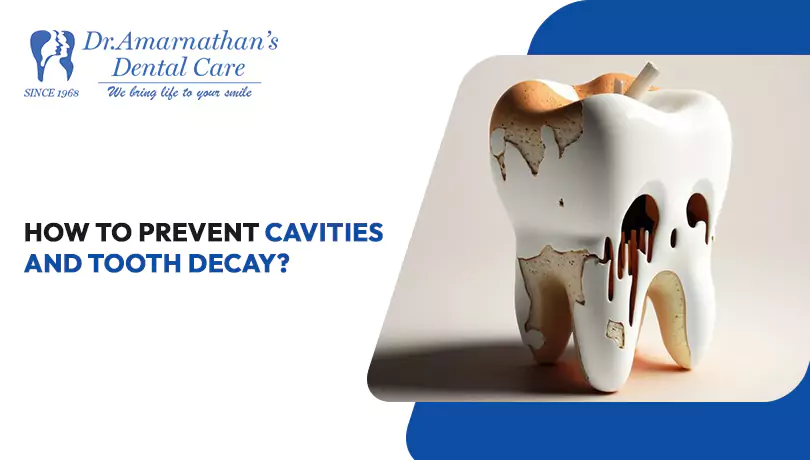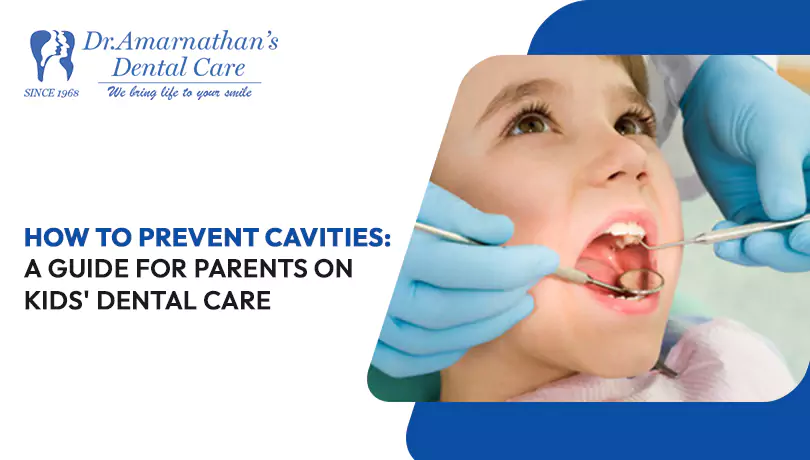
How to Prevent Cavities and Tooth Decay?
Preventing cavities and tooth decay are two common dental issues that can significantly impact oral health. Cavities, or dental caries, develop when mouth bacteria generate acids that wear away tooth enamel. Tooth decay results from untreated cavities progressing further into the tooth structure. It can lead to pain, infection, and tooth loss. This blog will explore practical strategies for maintaining optimal dental health and minimizing the risk of cavities and tooth decay. Following these simple yet crucial tips can safeguard your smile and preserve your oral well-being for years.
Understanding Cavities and Tooth Decay
Cavities and tooth decay are prevalent dental problems caused by various factors. These include poor oral hygiene, bacteria in the mouth, and sugary or acidic foods and drinks. Understanding the underlying causes is essential for implementing preventive measures effectively. Below, we will explore deeper into this topic:
Symptoms of Cavities and Tooth Decay
Cavities and tooth decay can present signs and symptoms indicating potential dental issues. Here are some common signs to watch out for cavities and tooth decay:
Tooth Sensitivity
You might experience sensitivity to hot, cold, or sweet beverages and foods. It indicates tooth decay has progressed to affect the nerves within the tooth.
Toothache
There can be persistent or intermittent tooth pain, especially when biting down or applying pressure. If so, this can be a sign of advanced cavity formation reaching the tooth’s inner layers.
Visible Holes or Pits
Cavities often manifest as visible holes or pits in the affected tooth, particularly in the enamel surface. These cavities may appear as dark spots or discolourations on the tooth surface.
Tooth Discoloration
Discoloration of the tooth enamel can range from white spots to brown or black stains. If it happens, it indicates the presence of decay and mineral loss in the affected area.
Bad Breath
You can have persistent bad breath or an unpleasant taste in the mouth, even after brushing and flossing. This issue may indicate bacterial activity and decay within the oral cavity.
Swelling or Pus
Is it facing swelling around the affected tooth or pus near the gum line? If so, it indicates an infection resulting from untreated cavities requiring immediate dental attention.
Gum Recession
Receding gums expose the tooth roots, which can increase susceptibility to decay. Besides, it may indicate underlying periodontal disease, exacerbating cavity formation.
Sensitivity to Pressure
Sensitivity or discomfort can happen when applying pressure to the affected tooth, such as chewing or biting down. Moreover, it suggests damage to the tooth structure due to decay.
Recognizing these signs and symptoms of cavities and tooth decay is crucial for early detection. If you experience these symptoms, consult your dentist for a comprehensive examination and appropriate treatment. Early intervention can help preserve your oral health and prevent complications associated with untreated cavities.
Maintaining Proper Oral Hygiene: A Key to Cavity Prevention
Proper oral hygiene is essential to prevent cavities and maintain overall dental health. The following are a few tips to keep your oral hygiene in check:
1)Maintain Proper Oral Hygiene
Effective cavity prevention starts with proper oral hygiene. Regular brushing and flossing help remove plaque, a sticky film of bacteria that forms on teeth and gums. Here are some essential tips for maintaining optimal oral hygiene:
Brush Twice a Day
Brush your teeth thoroughly with fluoride toothpaste at least twice daily, preferably after meals.
Floss Daily
Use dental floss or interdental cleaners to clean between teeth and remove plaque buildup.
Use Mouthwash
Rinse with fluoride mouthwash to help reduce plaque and prevent cavities in hard-to-reach areas.
Visit Your Dentist
Schedule regular dental check-ups and cleanings to detect cavities early and receive professional dental care.
Incorporating these habits into your daily routine can effectively remove plaque and prevent cavities and tooth decay.
2) Follow a Balanced Diet
Diet plays a significant role in dental health. Consuming sugary and acidic foods and drinks increases the risk of cavities by fueling bacteria in the mouth. To prevent tooth decay, follow these dietary guidelines:
Limit Sugary Foods
Minimize consumption of sugary snacks, candies, sodas, and desserts, as they contribute to cavity formation.
Choose Tooth-Friendly Foods
Opt for tooth-friendly foods such as fruits, vegetables, dairy products, and lean proteins that promote dental health.
Stay Hydrated
Stay hydrated by drinking water regularly to keep saliva production optimal. It helps neutralize acids and protect tooth enamel.
Limit Acidic Foods
Reduce intake of acidic foods and beverages, such as citrus fruits, tomatoes, and carbonated drinks. Why? They can weaken tooth enamel.
By making healthy dietary choices, you can support overall dental health. Furthermore, it will reduce the risk of cavities and tooth decay.
Use Fluoride Products
Fluoride, a mineral, fortifies tooth enamel and aids in cavity prevention. Incorporating fluoride products into your oral care routine can provide added protection against tooth decay. Here’s how to use fluoride effectively:
Use Fluoride Toothpaste
Choose a fluoride toothpaste approved by dental professionals and brush your teeth thoroughly with it twice daily.
Drink Fluoridated Water
Drink tap water that contains fluoride, as it helps remineralize teeth and reduce the risk of cavities.
Consider Fluoride Treatments
Consult your dentist about fluoride treatments, such as varnishes or gels. It can be applied to the teeth for extra protection.
Ensuring adequate fluoride intake can strengthen tooth enamel and enhance cavity resistance.
Practice Dental Sealants
Dental sealants are thin shields applied to the chewing surfaces of molars and premolars, offering protective layers. They safeguard against decay in challenging-to-reach spots. Here’s the scoop on dental sealants:
Consult Your Dentist
Talk to your healthcare professional about the advantages of dental sealants. You should note that children and teenagers are at higher risk of cavities.
Undergo Sealant Application
Schedule an appointment to have your dentist or dental hygienist apply dental sealants.
Maintain Sealants
Regularly visit your dentist for check-ups to ensure the sealants remain intact. And doing this will provide continued protection against cavities.
Dental sealants are a valuable preventive measure for reducing the risk of tooth decay, particularly in vulnerable areas of the mouth.
Remember, a commitment to proper oral hygiene is the foundation of a cavity-free smile and long-term dental well-being. Following these simple steps, you can protect your teeth and enjoy a lifetime of healthy smiles.
Wrapping Up
Preventing cavities and tooth decay is essential for maintaining optimal oral health and preserving your smile. Following the above tips, you can effectively protect your teeth from decay and enjoy a lifetime of healthy smiles. Remember to schedule regular dental check-ups and cleanings to monitor your oral health and address any concerns promptly. You can keep cavities and tooth decay at bay with proactive care and preventive strategies. Experience a confident and healthy smile for many years ahead.






